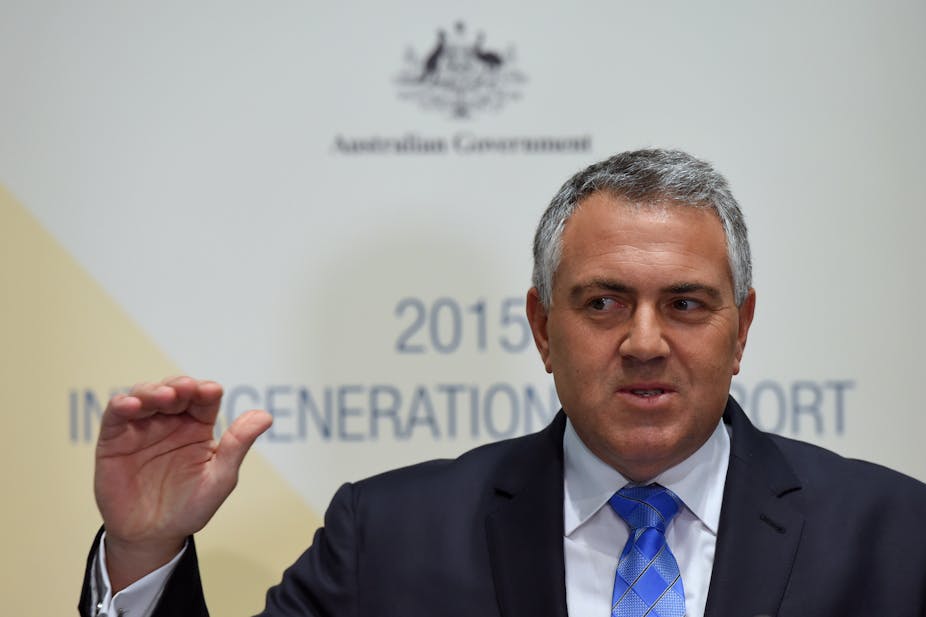The Intergenerational Report aims to provide a long-term picture of future Australian prosperity, and the sustainability of government budgets. It should be a serious report. But this year it resembles a Harry Potter movie.
Like a Harry Potter tale, the report starts with prosaic reality. Future prosperity is most affected by productivity growth. Highly productive scenarios could make Australians 8% better off in 2055 than they would be otherwise. Participation makes some difference. If we see large increases in the proportion of older people who work, Australians could be 2% better off in 2055.
But most of the report is about the sustainability or otherwise of the Commonwealth Budget. And that is primarily a story about the magic of compound interest. If the Commonwealth doesn’t get its deficit under control over the next few years, and it’s allowed to compound, then the interest bill will be 7% of GDP – almost a third of Commonwealth outlays – by 2055. It sounds like the scary bits of a Harry Potter movie – and has about as much connection with reality. Any projection of a short-term deficit that is allowed to compound will lead to very ugly numbers over 50 years.
The long-term projections do highlight the most important part of the May 2014 Commonwealth budget. The Commonwealth abandoned its previous agreement to contribute to the long-term growth in hospital costs paid by the States. This saves the Commonwealth about 1.4% of GDP by 2055. It is far and away the largest single long-term reduction in Commonwealth spending. And of course, it simply transfers the deficit problem to State governments to solve.
The nasty monster of ‘previous policy’
Most of the other long-term projections are like the non-scary bits of a Harry Potter movie. Firstly, they don’t seem to add. The report claims that the measures held up in the Senate are worth about 1.3% of GDP by 2025. The Parliamentary Budget office’s estimate, released a few days ago, was only 0.7%. The difference might not sound like much, but the magic of compound interest has a big impact by 2055.
The report casts previous Labor government budgets as the nasty monster of “previous policy”. They seem very bad – although like Hagrid, they’re less horrible than they look. The “previous policy” conveniently includes all of the Labor government’s spending measures, but excludes the revenue from its carbon and mining taxes.
The report also has some assumptions about spending that turn out as well as the ending of a Harry Potter movie. The Commonwealth Government is planning to limit how much it spends on supporting home care programs for seniors – but these “savings” may well lead to more people moving into much more expensive aged care facilities and hospitals. The report assumes that the higher education reforms lead to big savings. Requiring students to pay a larger percentage of the cost of their degree should save money – the report assumes over 1% of GDP by 2055. But it remains to be seen whether the proposed uncapped university fees lead to big increases in debt that ultimately goes unpaid.
Real, long-term problems
Perhaps the most worrying issue is that the report glosses over the long-term problems of the real world. Health costs are assumed to grow much more slowly over the next 10 years as a result of specific measures taken by governments. Previous Intergenerational Reports have all made the same assumption, and they’ve all been wrong. Health costs have generally continued to spiral upwards, consuming an increasing share of government budgets.
The other big concern is the growth in the Age Pension. In accordance with the May 2014 proposals, the report assumes that Age Pension spending will grow at inflation – not average weekly earnings – for 12 years, and then only grow in proportion with weekly earnings. Indeed it forecasts that Age Pension spending will fall as a percentage of GDP over the next decade. That implies a big change in government behaviour – governments of all stripes have made decisions on three separate occasions over the last decade to increase the Age Pension over and above average weekly earnings, and to broaden eligibility.
The Harry Potter story ultimately distracts us from the important question that faces us in the short term: what is the best way to repair our substantial and recurrent budget deficits? Australian governments have run deficits at 2 to 3% of GDP for the last six years in a row, and at the current rate will continue for the next three years. Future taxpayers will be responsible for paying back these deficits, and they are entitled to real-world answers now.

